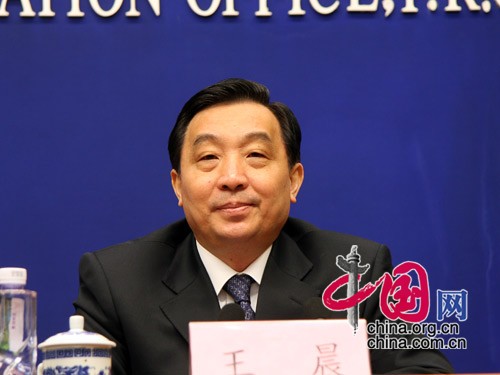A senior Chinese official on Tuesday hailed the publication of the nation's first human rights action plan as a major step in promoting the cause's all-round development in the country.
"It signals that the human rights cause has become a major theme of China's national construction and social development, and has been ushered into a new phase of planned, all-round development," said Wang Chen, minister in charge of the State Council Information Office, which issued the National Human Rights Action Plan of China (2009-2010) on Monday.
|

|
|
Wang Chen, minister in charge of the State Council Information Office. |
"It will help foster and promote the concept of respecting and safeguarding human rights at various levels of governments, in different sectors and the whole society at large, and forcefully propel the human rights cause in China," Wang said in an interview with Xinhua and the People's Daily.
The plan defines the Chinese government's goals in promoting and protecting human rights in less than two years, and the specific measures it is taking to this end.
The 54-page document is divided into five sections: Economic, Social and Cultural Rights; Civil and Political Rights; Rights and Interests of Ethnic Minorities, Women, Children, Elderly People and the Disabled; Education in Human Rights; Performing International Human Rights Duties, and Conducting Exchanges and Cooperation in the Field of International Human Rights.
Wang said practicability and feasibility constituted the most distinctive features of the action plan.
"It is dedicated to improving human rights through solving actual problems concerning the general public's interests," he said.
Wang said the plan involved broad participation of more than 80 relevant government departments and non-governmental organizations.
"The drafting process has become one of awareness enhancement and responsibility implementation," he said.
Wang urged governments and government departments at all levels to make the action plan part of their responsibilities and proactively implement it, and public institutions, social and non-governmental organizations, press and media agencies, and the general public to give vigorous publicity to this action plan, and expedite its implementation.
According to Wang, the action plan was framed in response to the United Nations' call in 1993 for establishing a national human rights plan. China was one of the 26 countries that have responded to the call.
The plan reflected the principle that "the state respects and protects the human rights of its citizens" prescribed in the Constitution of China, and the essentials of the Universal Declaration of Human Rights and International Covenant on Civil and Political Rights, he said.
Wang said the realization of human rights in the broadest sense had been a long-cherished ideal of mankind and also a long-pursued goal of the Chinese government and people.
Since the founding of the People's Republic of China in 1949, and the adoption of the reform and opening-up policy at the end of 1978 in particular, the Chinese government has made efforts to promote and protect human rights.
"The human rights conditions are at the best of the Chinese history," he said.
However, as a developing country with a population of 1.3 billion, China's human rights development still faces many challenges, Wang said, listing areas to be improved including civil participation, social justice, employment, social security, education and healthcare.
He believed that if the action plan was seriously implemented and problems concerning people's direct and real interests were addressed, the human rights cause in China would record an even bigger progress.
The full text of National Human Rights Action Plan of China (2009-2010)
(Xinhua News Agency April 14, 2009)